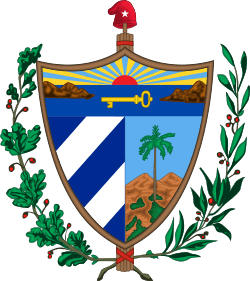Antonio Maceo Brigade
The Antonio Maceo Brigade was a political organization in the mid 1970s composed of Cuban Americans that demanded the right of travel to Cuba for Cuban exiles and good relations with the Cuban government. The group was mainly composed of young Cuban Americans that had developed leftist sympathies from experiences in the civil rights movement and the anti-war movement, and were generally critical of anti-Castro rhetoric. The group was invited to Cuba personally by Fidel Castro. The visit brought a brief period of warmer Cuba-United States relations and brought attention to the Cuban-American left.[1]
Brigada Antonio Maceo | |
| Named after | Antonio Maceo |
|---|---|
| Formation | 1977 (Organized) 1978 (Formal formation) |
| Founder | Lourdes Casal and Marifeli Pérez-Stable |
| Purpose | Travel to Cuba |
| Location | |
History
Foundation
The proposal for an entourage of Cuban exiles to visit Cuba was first raised at the Instituto de Estudios Cubanos in 1974 by Lourdes Casal. Differing accounts would later exist as to how they got their name. One account says it was Casal's idea, while another claims the group was nameless until given the name by Cuban authorities during the group's first visit to Cuba.[2]
The travelers of the Antonio Maceo Brigade was a collection of 55 Cuban exiles, from the United States, Mexico, and Spain, headed by Lourdes Casal and Marifeli Pérez-Stable. The brigade only accepted members who had left Cuba in their youth through parental decision and did not participate in anti-Castro activities while in the United States. Many of the members were children of Operation Pedro Pan and had been active in social movements in the United States as well as having garnered sympathies for the Cuban government. Many were contributors the magazines Joven Cuba and Areito which both catered to Cuban Americans that favored dialogue with Cuba.[3][4][2]
First trip and dialogues
In December 22, 1977 the brigade took their first trip to Cuba,[2] on the request of the Cuban government after President Jimmy Carter briefly lifted the travel ban with Cuba.[3] The travelers were 55 Cuban exiles, because Cuba would only authorize 55 passports. During the groups two week visit they would be meet by cheering crowds, take tours, become involved in volunteer labor,[2] and visit family.[3]
After the visit Fidel Castro would call for dialogues with Cuban exiles abroad. These dialogues resulted in the release of political prisoners, family unifications, and relaxing of restrictions to visit Cuba.[3]
Continued trips
The Antonio Maceo Brigade was formally organized in 1978 after the first travelers return.[3] The formal organization would be modeled after the Venceremos Brigade but only offered trips to Cuban exiles regardless of background. The trips are meant for the visitors to reconnect with family, assist in projects in Cuba, and evaluate the island for themselves.[5]
Various Cuban exiles have traveled to Cuba with the organization's assistance and the organization continues to exist today.[3]
Legacy
Anti-communist backlash
After their original trip to Cuba, militant anti-communist factions of the Cuban exile community criticized their visit. In 1979 Carlos Muñiz Varela would be assassinated in Puerto Rico.[3]
Politics of Cuban exiles
To both Cubans and Americans, Cuban exiles were seen less as a solid anti-communist conservative bloc. The plurality of Cuban exile politics became more apparent to the public. The brigade also opened a space for the involvement of Cuban Americans in leftist politics.[2]
Members
Many members would later become disillusioned with their hopes for Cuba, and lose their revolutionary sympathies.[4] One former member Elsa Alvarez would be arrested in 2006 for allegedly spying for Cuba whil working at Florida International University.[6]
See also
References
- "The Antonio Maceo Brigade and the Politics of Cuban migrant Radicalism in 1970s America".
- Teishan Latner. Cuban Revolution in America Havana and the Making of a United States Left, 1968–1992. University of North Carolina Press.
- Vicki L. Ruiz; Virginia Sánchez Korrol. Latinas in the United States, set: A Historical Encyclopedia. Indiana University Press.
- Yvonne M. Conde. Operation Pedro Pan The Untold Exodus of 14,048 Cuban Children. Routledge.
- María Cristina García. Havana USA: Cuban Exiles and Cuban Americans in South Florida, 1959-1994. University of California Press.
- "One of two accused spies was Maceo Brigade member". Miami Herald. Archived from the original on
|archive-url=requires|archive-date=(help).
